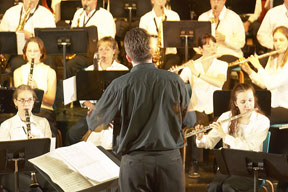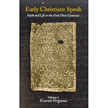Audience of One: A New Take on the Sunday Assembly
Monday, February 25, 2008 Spying the “Free Concert” poster, I just couldn’t pass up free entertainment. I arrived way early and knocked loudly at the main entrance. A janitorish man let me in.
Spying the “Free Concert” poster, I just couldn’t pass up free entertainment. I arrived way early and knocked loudly at the main entrance. A janitorish man let me in. “Welcome,” he said. “Your first time? You’re in for an unforgettable experience.”
In the concert hall, the orchestra chairs were arranged in concentric semicircles, all facing a small, raised platform. A few musicians were already taking out instruments, adjusting stands, and warming up.
No one had bothered to set up the audience chairs yet. Except for one folding chair set smack in the middle of the hall, the large area was empty.
“We have players at all levels, from rank beginners to virtuosos,” my janitor-guide explained. “If you assume that won’t work so well, are you in for a surprise.”
More players came in every moment now, and the chaos was building, with all the chatting and tuning up, arranging stands, and taking out music. I was getting antsy to sit down, but no one was busy arranging the audience chair. I was quite unwilling to sit in that isolated, central seat.
Special seating
The janitor, who had been helping the percussion section set up, sensed my unease and walked over. “Remember I said ‘unforgettable’? You are not going to sit out there but up here. I’ve already picked a spot for you in the woodwinds.”
He showed me my seat, introducing a female oboe player to my right. “That empty seat beside you,” he said, “belongs to one of our first-year clarinetists.” She’s a little squawky sometimes. I hope you don’t mind.” He gave my arm a gentle squeeze as I sat down. “Ah, here Francine comes now.”
“Not a problem.” I could already feel the excitement begin to rise inside of me.
Audience of One
At the top of the hour everyone was in place. I noticed others without instruments, sitting here and there throughout the orchestra. Then I looked out to where the audience would be, just as an elderly man seated himself in that one chair.
Conductor surprises me
My interest got an upgrade into astonishment,
 because the man I took for a janitor stepped onto the platform. Every member came to immediate attention as he raised his baton.
because the man I took for a janitor stepped onto the platform. Every member came to immediate attention as he raised his baton. “Him?” I gasped, just as everyone became hushed. The conductor smirked at me.
“Surprised?” whispered the oboist.
I caught myself and dropped my voice. “I’m flabbergasted! But where’s his sheet music?”
“Doesn’t need it,” she answered. “Got it all memorized.”
The concert begins
Then instantly we launched into a wonderful symphony, rich with chords, arpeggios, trills, melodic lines established and then echoed from section to section in various octaves. At first the music was thunderous and majestic, then it softened to a heart-rending whisper. A few times I could hear Francine’s missed, off-tune notes, but it didn’t seem to matter. Somehow even the worst of them naturally harmonized with the rolling chords and lyric melodies and made the whole just that much more beautiful.
I looked out to the audience of one. The old man was leaning forward, watching intently, his eyes roving around the orchestra as each instrument came in on cue. I could tell he was delighted, his eyes glistening.
When the long symphony was over, the old man stood up with amazing gusto, applauding loudly and yelling out, “Bravo! Bravo!”
The conductor made a deep bow and turning to the players, motioned for them to stand. The oboist gave me a nudge and urged me to stand with them. Then everyone bowed, as the old man continued clapping and crying, “Encore! Encore! Encore!”
Encore
At the conductor’s direction, all resumed their seats. They shuffled their music and launched into a snappy march. Its repeating stanzas built to a tremendous crescendo in which it seemed everyone in the orchestra was playing at once, loudly and furiously. Then suddenly they fell silent, though the echo of that final chord bounced around the walls a few seconds.
The old man once more took to his feet with the energy of a youngster, clapping and yelling, “Bravo! Bravo!” He continued in this manner for some minutes, prompting the conductor and the orchestra to bow time and again.
When he finally became quiet, he did not sit down again. In fact, everyone remained standing, myself included.
Post-concert conversation
The conductor bowed low once more. “I hope you enjoyed the concert, Father,” he said.
“I did. It’s the best yet. Thank you! Thank you so much, all of you, guests included.” At this point I was surprised when, for a lingering moment, he looked straight at me.
As all the musicians packed up to leave, the conductor strolled over. “I hope our concert kept you awake,” he said with a chuckle. “We put on one of these every Sunday, case you’re interested.”
“Every Sunday? Same set-up?”
Week-day activities
“Yup, and the same audience. He never tires of it, and we never tire doing our best to please him.”
I was puzzled. “But what about the rest of the week? Given over to practice, practice, practice, I suppose? Rehearse, rehearse, rehearse?”
“Actually, no,” the conductor said. “We do have some training sessions, but mostly we’re out performing more concerts. In fact, daily concerts, but not here, and not everyone together like this. Some ensembles perform—octets, quartets, trios, duets. And quite a few are solo performers. Maybe you have seen them on the streets of the city. In fact, to a man and to a woman, all of them are street musicians Monday through Saturday.”
“Now that you mention it,” I said, “I have seen some of them perform.” I recalled for him the saxophone player at the Cross-Central train platform, who was especially good. Always cheerful, always smiling, and strangely, always refusing tips.
“They play for the joy of it,” he responded, “Not for tips. The music fills them up and just has to spill out. All week they play, from the time they wake up until just before they fall asleep. They play and they recruit more members, help them pick out an instrument that suits them and then tutor them on the fundamentals.”
I am recruited
The conductor leaned over close. “I think you would be a good clarinet player,” he said. “At least as good as Francine, that teen who played next to you today.” Remembering her squawks and screeches, but also recalling how the symphony deftly absorbed and accommodated each one of them, I nodded and murmured, “Perhaps so.”
And that’s how I became a member of the orchestra on Sundays and a street musician Mondays through Saturdays. Although my playing has gotten better over the years, it seems I cannot delight the Old Man any more than I did during my first performance.
Parable Postscript
A matter of covenants
 In the Old Israelite Covenant, when all of the symbols were trotted out for everyone to see and hear, the temple orchestra had cymbals, ram’s horns, lyres, trumpets, and other instruments (see Psalm 150). All of this pleased the Father and were done at His command (2 Chron. 29:25). But in the New Christian Covenant, the multiracial one, the only instrument in worship is played on heart-strings: “Sing and make music in your heart, always giving thanks to God the Father” (Eph. 5:19; compare Col. 3:15-17).
In the Old Israelite Covenant, when all of the symbols were trotted out for everyone to see and hear, the temple orchestra had cymbals, ram’s horns, lyres, trumpets, and other instruments (see Psalm 150). All of this pleased the Father and were done at His command (2 Chron. 29:25). But in the New Christian Covenant, the multiracial one, the only instrument in worship is played on heart-strings: “Sing and make music in your heart, always giving thanks to God the Father” (Eph. 5:19; compare Col. 3:15-17). For the first thousand years of Christianity, a cappella music was standard. In fact, the phrase ‘a cappella’ itself means “like in church.” All of those old-covenant, external symbols—instruments, incense, robes, priests, temples, sacrifices, drink offerings—the Lord internalized in the New (see Rom. 12:1-2; 13:14; Eph. 2:19-22; Phil. 2:17; 2 Tim. 4:6; 1 Peter 2:4-5, 9; Rev. 5:8; 19:8). Slowly but surely, however, the medieval church brought back the Old Covenant externals. That was a mistake, indeed a heretical relapse. Making them external hollowed out the internal, spiritual life of the Christian.
New perspective on the Sunday assembly
It would be a mistake, therefore, to take my little parable too literally. I mean for the musical fusion between musicians and their instruments to stand for all Christian attitudes and actions. In addition, I am attempting to offer a perspective on the Sunday assembly that may be new to you, perhaps even seem bizarre. Despite all our disclaimers, I’m suggesting that in one sense, at least, it really is a performance after all! But our role in this concert is not to be the audience but the performers.
God is the audience. We offer him “the sacrifice of praise—the fruit of lips that confess His name” (Heb. 13:15; see the praise sections of Revelation, especially 4:8-11; 5:8-14; 7:9-12; 11:15-19; 12:10-12; 15:2-4; 16:5-7; 19:1-10).
On Sunday, we all perform together. The rest of the week we perform in small groups or alone. But our audience remains that same Person and His Son, our beloved Maestro.
Want to go deeper?
The following are recommended to help you look deeper into the nature of worship and the place of the Sunday assembly. Of course, I cannot endorse anything carte blanche outside of Scripture. Be disciminating in your judgment! That's a big part of what it means to Go Deeper.
Recommended for purchase:
 Everett Ferguson. Early Christians Speak, Vol. 2 (2002) – See especially chapter 10: Spiritual Worship: Spiritual Sacrifice and Priesthood. View Table of Contents
Everett Ferguson. Early Christians Speak, Vol. 2 (2002) – See especially chapter 10: Spiritual Worship: Spiritual Sacrifice and Priesthood. View Table of Contents
John L. Girardeau (Presbyterian seminary professor & preacher). Instrumental Music in the Public Worship of the Church (Reprint: 2006)
Allen P. Ross. Recalling the Hope of Glory: Biblical Worship from the Garden to the New Creation –View Table of Contents
Geoffrey Wainwright and Karen Westerfield-Tucker, eds. The Oxford History of Christian Worship (2005)
Online Resources:
Neil Lightfoot. "Exegesis of Ephesians 5:19 & Colossians 3:16"
Wayne Jackson. "What is A Cappella Music?" (2007) – See Jackson's list of additional resources.
John L. Girardeau. "The Discretionary Power of the Church" (sermon published in 1907) – see especially pp. 36-40.
Labels: christian assembly, church music, sunday service, theology of worship, worship